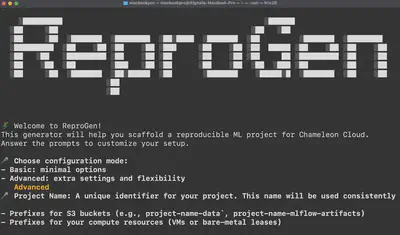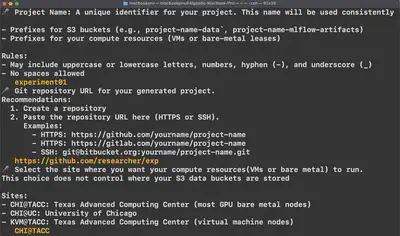Final Report : Streamlining Reproducible Machine Learning Research with Automated MLOps Workflows
Final Report: Applying MLOps to Overcome Reproducibility Barriers in ML

Background
Hello! I’m Ahmed Alghali, and this is my final report the project Applying MLOps to Overcome Reproducibility Barriers in ML under the mentorship of Professor Fraida Fund and Mohamed Saeed.
This project aims to address the reproducibility problem in machine learning—both in core ML research and in applications to other areas of science.
The focus is on making large-scale ML experiments reproducible on Chameleon Cloud. To do this; we developed ReproGen, a template generator that produces ready-to-use, reproducible ML training workflows. The goal: is to make the cloud easy for researchers setting up experiments without the worry about the complexity involved in stitching everything together.
Progress Since Mid-Report
Migration from Cookiecutter to Copier
we initially used Cookiecutter for template generation as a templating engine, but it lacked features we were interested in (e.g., conditional questions). we switched to Copier, which provides more flexibility and better matches our use case.
Support for Multiple Setup Modes
We now offer two setup modes, designed to serve both beginners and users who want advanced options/customization:
Basic Mode – minimal prompts (project name, repository link, framework).
Advanced Mode – detailed control (compute site, GPU type, CUDA version, storage site, etc.).
this ensures accessibility for new users, while still enabling fine-grained control for users.
Automated Credential Generation
previously, users had to manually generate application credentials (via Horizon OpenStack UI). now, we provide scripts that can generate two types of credentials programmatically—Swift and EC2—using Chameleon JupyterHub credentials with python-chi and the openstack-sdk client.
Automatic README.md Generation
each generated project includes a customized README.md, containing setup guidance and commands tailored to the user’s configuration.
Bug Fixes and UX Enhancements
Alongside major features, we implemented numerous smaller changes and fixes to improve the reliability and user experience of the tool.
Deliverables
ReproGen GitHub Repository: source code for the template generator.
mlflow-replay branch: explore a past experiment, artifacts, and logged insights.
LLM-Demo branch: hands-on demo to track fine-tuning of an LLM using infrastructure generated by ReproGen.
Next Steps
Compatibility Matrix
- the tool and the generated setup both depend on software dependencies that required paying attention to compatibility. in all level Hardware, OS, Drivers, Computing Platforms, core and 3rd-party libraries. writing a documentation as a start to help future debugging and adding pieces without breaking what is there. .
Maintain Docker Images
so far we have a cpu and GPU docker images for multiple most frequently used framework.
- CPU based image: for data science workload (Scikit-Learn)
- GPU-Nvidia Variant: for Deep Learning workload on Nvidia Machines (Pytorch, Lightning, TensorFlow)
- GPU-AMD Variant: for Deep Learning workload on AMD Machines (Pytorch, Lightning, TensorFlow) adding more variants for more frameworks + Enhancing the experience of the existing images is recommended.
Reflection
When I first joined SoR 2025, I had a problem crystallizing the idea of how I can practically achieve reproducibility and package a tool that would maximizes the chance of reproducing experiment build using it. throughout the journey my mentors took me under their wings and helped me to understand the reproducibility challenges in ML, my Mentor Professor Fraida Fund wrote materials that saved me a lot of time to familiarize my self with the testbed,important Linux tools and commands, and even getting to have hand on practice how large model training happen with MLflow tracking server system is done in the cloud. and Mohamed Saeed. who took the time reviewing my presentation pushing me to do my best. I’m forever thankful in the way they shaped the project and my personal growth. this hands-on experience help me viewing MLOps , cloud APIs, and workflow design in different lenses, and I’m proud to have contributed a tool that can simplify help reproducible research for others.